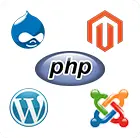What is PHP in detail?
PHP, which stands for Hypertext Preprocessor, is a popular server-side scripting language primarily used for web development. It is an open-source language that can be embedded into HTML code, executed on the server, and generate dynamic web content. PHP is widely used for developing dynamic websites, web applications, and APIs (Application Programming Interfaces).
Key features of PHP include:
Simplicity
PHP has a straightforward and easy-to-understand syntax, making it accessible to beginners and experienced developers alike. Its syntax is similar to C, Java, and other programming languages, which allows developers to transition easily.
Server-Side Scripting
PHP is a server-side scripting language, meaning it is executed on the server rather than the client’s browser. This allows PHP to generate dynamic content and interact with databases and other server-side resources.
Wide Platform Compatibility
PHP is compatible with various operating systems (Windows, macOS, Linux) and web servers (Apache, Nginx, IIS). This makes it versatile and ensures broad support across different hosting environments.
Extensive Library and Framework Ecosystem
PHP has a vast collection of libraries, frameworks, and extensions that simplify and accelerate web development. Popular PHP frameworks include Laravel, Symfony, CodeIgniter, and Zend Framework, offering robust features and tools for building scalable and maintainable web applications.
Database Integration
PHP has built-in support for a wide range of databases, including MySQL, PostgreSQL, Oracle, and SQLite. This allows developers to interact with databases, perform database operations, and retrieve or manipulate data.
Strong Community and Resources
PHP has a large and active community of developers worldwide. There are numerous online resources, forums, and communities where developers can seek help, share knowledge, and collaborate on projects.
Web Application Security
PHP provides various security features and functions to help developers build secure web applications. It offers measures to prevent common vulnerabilities like SQL injection, cross-site scripting (XSS), and cross-site request forgery (CSRF).
Scalability and Performance
PHP is designed to handle high-traffic websites and scale effectively. With proper optimization techniques, caching mechanisms, and code profiling, PHP can deliver efficient performance.
Types of PHP?
PHP is primarily known as a server-side scripting language used for web development. However, there are different types or variations of PHP that have emerged over time. Let’s explore a few notable types of PHP:
PHP
The Standard PHP: This refers to the original and widely-used version of PHP. It is the scripting language used for server-side web development and powers numerous websites and web applications worldwide. It provides a wide range of features, functions, and libraries for building dynamic and interactive websites.
PHP-FPM (FastCGI Process Manager)
PHP-FPM is a variant of PHP that is specifically optimized for high-performance and scalability. It works in conjunction with the FastCGI protocol and is commonly used in conjunction with web servers like Nginx or Apache to handle PHP requests. PHP-FPM helps improve the efficiency and handling of PHP processes, making it suitable for heavy traffic websites.
HHVM (HipHop Virtual Machine)
HHVM is a just-in-time (JIT) compiler developed by Facebook that executes PHP and Hack (a dialect of PHP) code. HHVM aims to improve PHP’s performance by compiling the code into a highly optimized bytecode before execution. It offers enhanced speed and efficiency and has been used by Facebook for their PHP-based applications.
PHP CLI (Command-Line Interface)
PHP CLI allows you to run PHP scripts directly from the command line, outside the context of a web server. It is commonly used for running scripts, performing administrative tasks, and automating processes on a server. PHP CLI is particularly useful for tasks like batch processing, system maintenance, and cron jobs.
PHP-GTK
PHP-GTK is a PHP extension that enables PHP to be used for developing desktop applications with a graphical user interface (GUI). It provides bindings to the GTK+ toolkit, allowing developers to create cross-platform desktop applications using PHP.
These are some notable types of PHP, each catering to specific use cases and scenarios. The standard PHP version remains the most commonly used variant for web development, but other variations offer specialized features and optimizations for specific purposes like performance, command-line scripting, or desktop application development.
If you required any then visit our website:- Php training in Chandigarh



